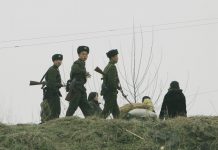
A major fight broke out recently between North Korean and Uzbek workers at a construction site in Russia, Daily NK has learned.
Speaking on condition of anonymity, a source in Russia told Daily NK on Monday that the fight occurred on the evening of Feb. 17 in the city of Chita, in Russia’s Far Eastern Federal District.
The fight was allegedly started for no apparent reason by six Uzbek workers who were passing by the North Korean workers’ dormitories. The Uzbek workers, who had been drinking heavily after work, began harassing and beating a North Korean worker who was smoking outside.
Within moments, ten more North Korean workers ran up and joined the fight, and the two sides faced off. But it became an all-out brawl when five more North Korean workers from a nearby construction site joined the fray.
“The melee escalated when five more North Korean workers heard the news and rushed to join in. The Uzbek workers beat four of the five latecomers senseless and then smashed the equipment in their work area,” the source said.
“The North Korean workers who were involved in the initial scuffle stood by and watched as the latecomers were beaten. Afterward, the workers explained that their behavior was motivated partly by their determination to return home safely with their earnings and partly by their fear of discrimination from the company and retaliation from the Uzbeks,” the source added.
The riot did not end until late in the evening when police were called to the scene and the four unconscious North Korean workers were taken to a hospital.
Compensation paid – but not to injured workers
After news of the evening’s fight reached the Russian project manager the next day, he demanded compensation from the company that employed the Uzbek workers. In other words, the Russian who managed the North Korean workers at the site was directly involved, rather than the company that employed the North Korean workers or the North Korean embassy in Russia.
“This Russian had a generally positive impression of the North Korean workers because they always cleared away the sand piles and neatly organized their materials and tools after finishing work. That’s why he took a personal interest in the matter and demanded that the North Korean workers receive compensation for their injuries,” the source said.
In the end, the company managing the Uzbek workers paid a total of RUB 800,000 (around USD 8,696) on Feb. 20 to the four North Korean workers who were taken to the hospital after being knocked out.
But the workers never saw a single cent of the compensation money, which went to the North Korean company that employs them.
“The North Korean company told the workers that their compensation would be used to cover their hospital bills, their quota of time off work, and the company’s operating expenses. The workers complain that they have to rush back to work to meet their monthly quota without any compensation or proper medical treatment,” the source said.
The source said that some North Korean workers at the site were upset that the higher-ups got to pocket the compensation money when it was the injured workers who were beaten half to death. Others found it absurd that the injured workers had to focus on meeting their quotas for the state without even being allowed to file a complaint.
After the incident, North Korean companies in Russia instructed their workers to stay out of fights, even if their lives were in danger, reminding them that any attempt to fight back would undermine North Korea’s international standing.
Translated by David Carruth. Edited by Robert Lauler.
Daily NK works with a network of sources living in North Korea, China, and elsewhere. Their identities remain anonymous for security reasons. For more information about Daily NK’s network of reporting partners and information-gathering activities, please visit our FAQ page here.
Please send any comments or questions about this article to dailynkenglish@uni-media.net.

















